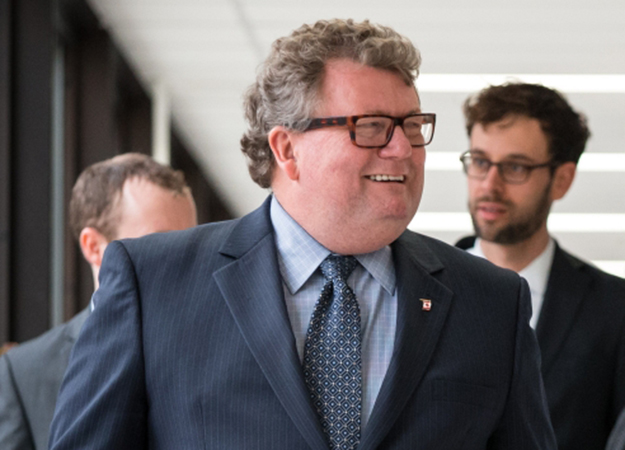Canada Research Chairs will ‘not only improve our health, but our quality of life’

The Honourable Ed Holder, Minister of State (Science and Technology), announced 137 new and renewed Canada Research Chairs at 34 postsecondary institutions across the country. This $118 million investment, with an additional $7.9 million in infrastructure support provided by the Canada Foundation for Innovation, will help promote innovation and support top-tier talent at Canadian postsecondary institutions.
What is in our cells, bones and muscles that determines how we fight disease, trauma and aging? Can we lower the risk of childhood and maternal obesity by promoting healthy weight gain during pregnancy? How can we ensure that our health care system is financed sufficiently by government?
Seven McMaster researchers have been awarded prestigious Canada Research Chairs in recognition of research at the vanguard of discovering answers to these questions.
Ali Ashkar, associate professor, pathology and molecular medicine, has been awarded a Tier 1 Canada Research Chair in Natural Immunity and NK Cell Function. Natural Killer (NK) cells are critical to our own innate natural defence against chronic viral infections and tumours. During chronic viral infections or diseases such as cancer, a patient’s natural immunity is often weakened. Ashkar’s research team has developed a method to expand an NK cell population outside of the body and then sets them against tumour cells or cells infected with a virus. By increasing the number and potency of a patient’s own NK cells, tumour cells or virally infected cells can be eliminated with minimal side effects.
Mohit Bhandari , professor, orthopaedic surgery, has been promoted to a Tier 1 Canada Research Chair in Evidence-Based Orthopaedic Surgery. Dr. Bhandari will be building on a stellar research program that began with his Tier 2 CRC in Musculoskeletal Trauma and Surgical Outcomes, continuing to improve the lives of persons with musculoskeletal trauma. Using multinational large randomized trials and large observational cohort studies, Bhandari’s research will focus on: road traffic and associated high energy trauma; intentional injuries in women (violence against women, intimate partner violence); and osteoporotic and low energy trauma in the elderly.
Dawn Bowdish will use her Canada Research Chair in Aging and Immunity to explore age-associated deterioration of the immune response. Of the one-third of deaths in the elderly that occur due to infectious disease, pneumonia is the most frequent and most costly. Bowdish – a professor of pathology & molecular medicine – will be investigating the mechanisms that cause pneumonia in the elderly and explore why acquiring a bacterial pneumonia in mid-or-late life often exacerbates or accelerates other chronic inflammatory conditions. Bowdish’s Tier 2 Chair provides her with the opportunity to develop novel approaches that will improve the lives of Canadians with age-associated inflammation and deterioration of the immune response.
Economist Katherine Cuff has had her Tier 2 Canada Research Chair in Public Economic Theory renewed for another 5 years. Cuff’s research program bridges the gap between pure theory and applied policy analysis by constructing theoretical models that capture the most important aspects of contemporary policy issues. These policy issues include the financing of health care, tax evasion, monitoring of unemployed transfer recipients and bequest taxation.
Vladimir Ljubicic, assistant professor, kinesiology, has been awarded a Tier 2 Canada Research Chair in Neuromuscular Plasticity in Health and Disease. Ljubicic’s research involves investigating how disease, exercise, and experimental drugs remodel the neuromuscular system. Neuromuscular disorders (NMDs) include the age related loss of muscle mass and function, Duchenne muscular dystrophy, spinal muscular atrophy and myotonic dystrophy. Ljubicic’s goal is to decipher how low-cost interventions such as physical activity, dietary supplements and common generic medications can be used to slow, prevent, or reverse the advance of these NMDs.
Sarah McDonald’s Canada Research Chair in Maternal and Child Obesity Prevention and Intervention (Tier 2) will further her innovative research program which examines two prevalent and serious interrelated health conditions that are adversely impacting women and their children: excess maternal pre-pregnancy weight and excess weight gain during pregnancy. Excess pregnancy weight gain (PWG) increases maternal risks for postpartum weight retention and obesity, and is a key risk factor for high infant birth weight and obesity in children. Dr. McDonald, associate professor, department of obstetrics and gynecology (Division of Maternal- Fetal Medicine) will focus on developing interventions that will promote healthy weight gain during pregnancy.
Guillaume Pare’s Canada Research Chair in Genetic and Molecular Epidemiology (Tier 2) has been renewed for another 5 years. Paré’s research focus is on the genetic determinants of complex diseases such as hypertension, coronary artery disease and cerebrovascular disease. Using cutting edge genomic techniques, Paré will investigate the genetic and molecular markers of these diseases to gain a better understanding of how to predict and ultimately prevent them.
“McMaster is committed to attracting and retaining some of our country’s best researchers,” said Mo Elbestawi, vice-president, Research and International Affairs. “Our five new Canada Research Chairs and the renewals of two Chairs recognizes research programs that are at the frontier of discoveries that will not only improve our health, but also our quality of life.”
There are two types of Canada Research Chairs:
- Tier 1 Chairs, tenable for seven years and renewable, are for outstanding researchers acknowledged by their peers as world leaders in their fields. For each Tier 1 Chair, the university receives $200,000 annually for seven years.
- Tier 2 Chairs, tenable for five years and renewable once, are for exceptional emerging researchers, acknowledged by their peers as having the potential to lead in their field. For each Tier 2 Chair, the university receives $100,000 annually for five years.
The Honourable Ed Holder, Minister of State (Science and Technology), announced 137 new and renewed Canada Research Chairs at 34 postsecondary institutions across the country. This $118 million investment, with an additional $7.9 million in infrastructure support provided by the Canada Foundation for Innovation, will help promote innovation and support top-tier talent at Canadian postsecondary institutions.

